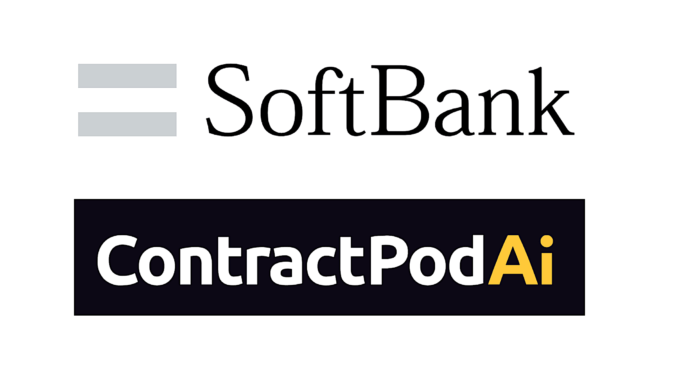
ContractPodAi (CPAi), the NLP-driven CLM company, has raised $115m in a funding round led by Japanese conglomerate SoftBank – its second legal tech investment this week. And in a sign of long-term commitment, Ayush Jain, a US-based Vice President at SoftBank Investment Advisers, will join the CLM company’s Board
CPAi’s CEO and co-founder, Sarvarth Misra, told Artificial Lawyer: ‘We now have the foundations for scaling. We can accelerate our growth plans, and also scale in the Asia-Pacific region.
‘We can now try and build a big business, and [with this funding] we have the capital and also the ingredients to build that big business.’

The investment came from SoftBank’s Vision Fund 2, and also saw the participation of Eagle Proprietary Investments, which had invested before. By chance, SoftBank also invested via its Ventures fund this week in MarqVision, an IP and legal tech startup.
Now, you may well ask: why is SoftBank investing in a CLM company such a big deal? The answer is that they have very, very deep pockets and tend to seek out what they believe will become category leaders. This investment was also part of their main Vision Fund, which tends to keep backing you until you become what they want you to become.
In fact, flick through their portfolio and it’s like reading a who’s who of tech-first brand names that much of the world knows today: Slack, Uber, Nvidia, Flipkart, Fetch, ByteDance, Revolut, eToro, Klarna, and more. There are also plenty of companies most people would not have heard of unless they were in that particular sector, but SoftBank at least wants them to become leaders in that niche.
So, having SoftBank in your corner financially, and with one of their VPs on your board, does have a special significance. And, it would seem highly likely – in fact hard to think otherwise – that SoftBank will be there again for whenever the next funding round comes along, and that the next round will be even larger.
Misra added that their last funding was in summer 2019 for $55m and they have never been the kind of business that sought new cash every six months. He also noted that: ‘We have had back-to-back record breaking sales, and this looks like it may be our best quarter ever.’
In terms of the valuation of CPAi, he said that they were not commenting publicly on that, but he could say it was around five times what it was at the time of the last funding.
When taken in the context of a raft of other investments in the CLM space – see analysis here – then one has to ask what impact such a huge funding will have? Artificial Lawyer asked if the way things were going meant that we would eventually see one CLM company dominate?
Misra said he believed that because the market was so large, and had different segments e.g. SME companies, large companies, global companies, that there would still be several major players a long time from now.
He also stressed that although in the legal tech world it may seem like CLM has been around for a long time – and it has, despite the CLM 2.0 rush we are seeing at the moment – that for most of the wider market CLM adoption is still at ‘an early stage’.
‘The market has a long way to go,’ Misra added. ‘There will be multiple [CLM] category winners.’
That said, he noted that the pandemic and the drive to digitisation of contracting that this demanded had accelerated things for CLM.
‘I thought the change [in the market] would be slower,’ he said.
Artificial Lawyer then asked if some of this cash would go into M&A deals, with CPAi buying up smaller rivals or bolting on capabilities that would be useful to add? Would CPAi become like Onit, or Litera, now that it had the money to do this kind of thing?
Misra reiterated that the focus was on scaling, and where clients wanted them to build out their platform, which already offers a range of no-code applications integrated into the CLM suite of capabilities, they would develop those solutions.
At present the core NLP tech of the platform is based on IBM Watson, with a range of workflow and contract management tools having been developed around it.
‘We will explore the inorganic route, but the focus is on executing what we are doing now,’ he stated.
So, he didn’t rule anything out, but it’s clear that M&A is not what CPAi is most focused on – in fact, as far as this site can see, they have not bought another legal tech company since they launched back in 2014. (That said, this site has learned over the years to always be prepared for the unexpected.)
To conclude, this site asked how it all felt, after all, not many legal tech companies reach nine figure funding rounds.
‘As said, we have a long way to go still, and we are humble about this. But, we are happy and excited, although there is also a sense of responsibility,’ Misra noted.
He added that CPAi ‘has a great team’ and that they are very much key to this success story.
Let’s give the last word to SoftBank’s Jain: ‘Despite the inexorable digitisation of the workplace, legal processes have largely resisted disruption. ContractPodAi’s technology aims to empower in-house legal professionals to radically improve business performance such as driving faster revenue recognition, increase compliance adherence and optimise operational workflows. We believe the company’s modularized, one platform approach extends way beyond existing CLM to capture a vast array of legal use cases across multiple jurisdictions.’
As to the future, the message is: scale, scale, scale. With this funding and what appears likely to be the long-term support of SoftBank and other investors, plus what is now a well-developed platform, they have every chance of meeting their global goals.
3 Trackbacks / Pingbacks
Comments are closed.